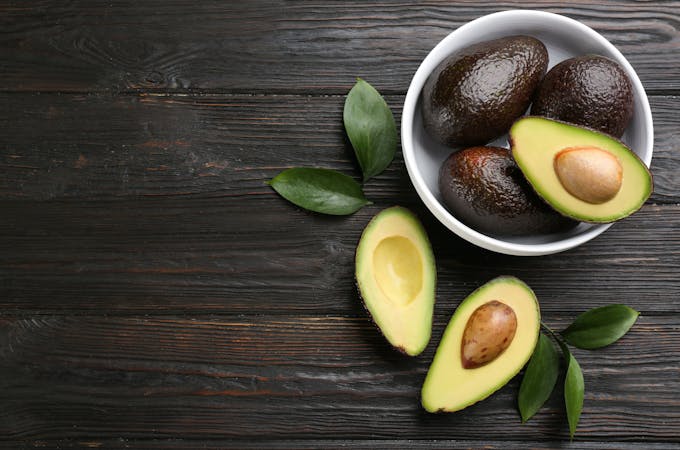The Health Benefits of Avocado
The health benefits of avocado are undeniable. Avocados are a highly nutritious, tasty, and versatile ingredient. Unsurprisingly, avocados have become a staple in many kitchens worldwide.
Let's look at the many health benefits of avocados and why you should regularly incorporate them into your Healthy Keto® diet.

Are avocados healthy?
Some argue that avocados are fruit, while others insist they are vegetables. In fact, avocados are large berries with a single seed. Regardless of their botanical classification, avocados are excellent for your health.
Avocados have an exceptional nutritional profile and rank amongst the highest fat-containing plant foods, making them a healthy and keto-friendly ingredient. Avocados are rich in monounsaturated fat and dietary fiber and are a significant source of vitamins and minerals.
A recent study found that regular avocado consumption is linked to several health benefits. They lower the risk of developing a wide range of serious health conditions, including heart disease, obesity, and metabolic syndrome.
Avocado nutrition facts
Avocados contain high amounts of healthy fat and fiber and are low in net carbs and sodium.
A medium-sized avocado contains:
240 calories
22 g total fat
15 g monounsaturated fat
4 g polyunsaturated fat
3 g saturated fat
13 g total carbs
10 g fiber
2 g net carbs
3 g protein
Avocados are rich in essential nutrients, including fat-soluble vitamins, minerals, and antioxidants that support a healthy body.
Avocados are an excellent source of:
Potassium
Vitamin E
Vitamin C
Vitamin K
Beta-carotene
B vitamins, especially folate, B5, and B6
Magnesium
Manganese
Zinc
Carotenoids, including lutein and zeaxanthin
Watch the below video to learn more about the health benefits of avocados.
12 benefits of avocado
Eating avocados as part of a healthy diet like keto is linked to many health benefits. In fact, research suggests that eating one avocado a day results in lower blood pressure, reduced risk of heart disease, improved blood lipid levels, and weight loss.
Here are 12 reasons why you should eat avocado regularly.
1. Nutritional powerhouse
Avocados are nutritional superfoods—they’re packed with essential nutrients needed for optimal nutrition and health.
In fact, avocados contain more potassium than bananas. Potassium is one of the most important electrolytes. It’s crucial for healthy nerve function and blood pressure regulation.
High amounts of monounsaturated fatty acids in avocados support healthy cell growth, increase heart-healthy HDL cholesterol, and stimulate the production of anti-inflammatory substances and immune cells.
Avocados also contain significant amounts of folate, a B vitamin necessary for healthy DNA and protein production. Because of its role in DNA replication, folate lowers the risk of birth defects, including spina bifida.
Vitamins C, E, and A, and the carotenoids lutein and zeaxanthin are potent antioxidants in avocados that help protect the cells in your body from oxidative damage and premature cell death.
2. Keto-friendly
Avocados contain around 75% fat and are very low in net carbs. No other fruits or vegetables have this keto-friendly fat-to-carb ratio. Their mild taste and creamy texture make avocados a healthy and versatile keto food.
To take your Healthy Keto diet to the next level, use fresh avocado in salad, oven-bake half an avocado with an egg, or try these delicious BLT avocado wraps.

3. Weight loss
Although they are high in calories, avocados help to maintain body weight and can enhance weight loss.
Avocados contain a unique fat molecule called avocatin B, which is linked to increased fat-burning and weight loss. Avocatin B supports healthy blood sugar control and stimulates your metabolism to burn fat and produce energy.
Avocados are rich in good fats and dietary fiber. Fat and fiber intake increases satiety, promotes weight loss, and supports weight management.
4. Heart health
Avocado intake has been studied extensively for its role in disease prevention. A diet high in avocados supports a healthy cardiovascular system and lowers the risk of high blood pressure.
Vitamin K in avocados is necessary for blood clotting and has potential benefits for heart health. Research suggests that a vitamin K-rich diet lowers the risk of arterial blockage and heart attacks.
5. Detoxification
Avocados are significant sources of insoluble fiber. This type of fiber supports digestive health, reduces the risk of constipation, and improves detoxification by speeding up the excretion of stool and waste products.
6. Bone health
Vitamin K is necessary to deposit calcium into bone and reduces urinary calcium excretion. The high amounts of vitamin K in avocados help to strengthen bones and lower the risk of osteoporosis in later life.
7. Healthy vision
Avocado is an excellent source of lutein and zeaxanthin. These carotenoids protect the sensitive cells in your eyes from harmful UV damage and lower the risk of developing age-related macular degeneration.
Monounsaturated fats in avocado also increase the absorption of fat-soluble vitamins, including vitamin E and beta-carotene, necessary for eye health and protection from eye disease and vision loss.

8. Anticancer
Incorporating avocados regularly into your diet may reduce your risk of developing certain cancers. They’re rich in carotenoids, antioxidants, folate, and fiber which are known to fight inflammation and support healthy cell renewal linked to reduced cancer risk.
Avocados also contain a unique peptide that may trigger the destruction of cancerous cells.
9. Antimicrobial
Defensin is a natural substance produced by avocados that protects from mold and bacterial overgrowth. In humans, defensin lowers the risk of E. coli and staph infections.
10. Skin health
Avocados provide skin-healthy nutrients, including vitamin C, necessary to produce collagen and needed for firm and tight skin. Vitamin C also protects your skin from UV damage and supports wound healing.
Monounsaturated fat, vitamin E, and beta-carotene in avocados are associated with skin, nail, and hair health. These nutrients keep skin hydrated and lower eczema and psoriasis symptoms.
11. Anti-inflammatory
Eating avocado helps you fight inflammation, which supports a healthy body and lowers the risk of developing a range of diseases, including arthritis, heart disease, depression, cancers, and eczema.
Monounsaturated fats in avocado stimulate your body to produce anti-inflammatory substances and promote immune function to counteract inflammation.
Avocado is also rich in insoluble fiber, supporting digestive tract health and lowering inflammation in the colon. This may help reduce the risk of intestinal inflammatory conditions, including colitis and colon cancer.
12. Balanced moods
Avocado consumption may help to improve symptoms of depression and low moods.
Both folate and vitamin K support balanced neurotransmitter levels in the brain, explaining why avocado intake can improve moods and increase well-being.
Avocados also are rich in vitamin E, which supports overall brain function and cognitive health.

How to select ripe avocados
Select your avocados based on how quickly you plan to eat them to get the best quality, texture, and taste.
Choose ripe avocados if you are using them within a day or two. Ripe avocados have dark, almost black skin and a slightly bumpy texture. They are firm but do yield somewhat to pressure.
To purchase avocados a few days in advance, pick green ones with smooth skin that are very firm when you apply pressure. These avocados will ripen within three to four days at room temperature.
Avoid soft avocados that appear shriveled and dented and very dark in color. These are overripe and have an unpleasant taste and texture.
You can also slow down the ripening process by placing avocados in the fridge. This is helpful if you purchased too many ripe avocados at once.

Key takeaways
Avocados are a shining star among the superfoods. They are excellent sources of nutrients, including vitamins, minerals, antioxidants, and fiber.
Avocados have a high fat-to-carb ratio—and they’re rich in heart-healthy fat, including monounsaturated fatty acids.
Regular avocado intake can support a healthy body and lower the risk of developing serious health conditions, including heart disease, macular degeneration, osteoporosis, and certain cancers.
FAQs
1. What are avocados?
Avocados, also known as alligator pear or butter fruit, are actually a type of berry with a large single seed. They have bright green flesh with a mild taste and creamy texture.
Avocados are nutritional powerhouses and rich sources of healthy fats, dietary fiber, and essential nutrients. They are versatile ingredients that can be added to salads and smoothies and can be oven-baked or stuffed.
2. Are avocados healthy?
Yes, avocados are exceptionally healthy. Their unique nutritional profile provides significant amounts of healthy fats and essential nutrients, including vitamins, minerals, fiber, antioxidants, and cancer-fighting defensin.
The many health benefits of avocados are hard to ignore. Consuming avocados regularly helps to achieve and maintain a healthy weight, supports optimal nutrient levels, and lowers the risk of microbial infections.
3. What are the benefits of avocado?
Avocado consumption supports healthy weight, improves skin and vision health, and lowers the risk of developing diseases, including heart disease, high blood pressure, metabolic syndrome, osteoporosis, certain cancers, and arthritis.
Avocados promote weight loss and support weight maintenance. They contain around 75% fat and are high in fiber, promoting satiety and reducing hunger. Avocados also contain a fat molecule called avocatin B, which boosts your metabolism and promotes fat-burning.
Avocados are rich sources of insoluble fiber linked to digestive health and improved detoxification. This type of fiber helps the beneficial bacteria in your gut to thrive, supporting immune function and lowering inflammation.
Several of the nutrients in avocados have potent antioxidant properties, including vitamin E, vitamin C, and the carotenoids lutein and zeaxanthin. Antioxidants protect your cells from harmful oxidative damage linked to premature aging and the development of diseases.
4. Are avocados keto-friendly?
Yes, avocados are very keto-friendly. In fact, avocados contain the most fat of all fruits and vegetables, and their high-fat to low-carb ratio makes them a healthy ingredient for your keto recipes.
Check out this keto food list to learn about other nutritious keto-friendly foods.
5. Are avocados safe for everyone?
Avocados are generally safe and cause few adverse health effects. Some people appear sensitive to avocados and may experience diarrhea if they consume too many. This is likely caused by the insoluble fiber, and moderating avocado intake resolves this issue.
Although rare, some individuals with latex allergies can also experience allergic reactions when consuming avocados. Avocados contain similar proteins to the ones found in latex from rubber trees.
6. Is it safe to eat an avocado pit?
Yes, it's safe for humans to eat avocado pits. Avocado pits are nutrient-dense and significant sources of anti-inflammatory phytochemicals.
Don't eat raw pits, as these are likely to cause gastrointestinal upset and nausea. To get the most out of avocado pits, cut, dehydrate, and grind them into a fine powder that can be added to smoothies or soups.
Learn more about eating avocado pits in this video.
7. Will avocados help me lose weight?
Avocados are high in calories, but there is no need to worry that you will gain weight. In fact, avocados contain avocatin B, a fat molecule that helps to shrink belly fat by stimulating your metabolism to burn fats.
Avocados' high fat and fiber content promotes satiety and reduces hunger, helping with weight management and weight loss.
8. Is avocado oil healthy?
Yes, avocado oil is a great choice to promote a healthy body. Avocado oil is a rich source of heart-healthy fats, vitamins, minerals, and phytochemicals.
Avocado oil has similar health benefits to avocados and helps lower blood pressure, increase heart-healthy cholesterol, and reduce inflammation. Avocado oil has a high smoke point, meaning it can be safely heated to high temperatures. This makes it an excellent cooking oil.
9. How do I know if an avocado is ready to eat?
Ripe avocados have dark, almost black skin with a bumpy texture. They are firm but do yield somewhat if pressure is applied.
A firm avocado with green, smooth skin is likely underripe and needs a few more days to ripen. If an avocado is black, dented, and squishy, it’s overripe and likely will have an unpleasant texture and bitter taste.
Previous blog
How Long Before a Diabetic Goes BlindNext blog
Is it Safe to Eat an Avocado Pit
Popular
08/21/2024
47.1K views
05/22/2024
41.3K views
11/18/2024
244.9K views
03/18/2024
11/21/2022




